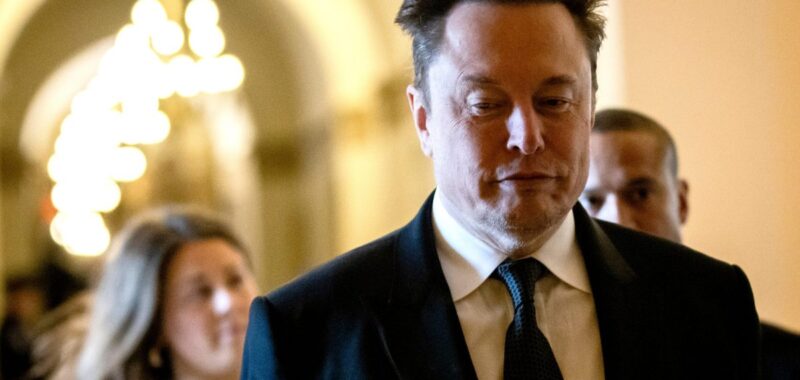
Elon Musk is once again going after the tech company he helped found. Musk filed a lawsuit Monday suing OpenAI and co-founders Sam Altman and Greg Brockman, alleging they “manipulated” Musk to help create the company.
The lawsuit claims OpenAI breached the company’s initial commitment to benefit humanity in favor of business interests. Altman and OpenAI’s leaders “intentionally courted and deceived Musk, preying on X owner’s humanitarian concern about the existential dangers posed by artificial intelligence,” the complaint alleges.
Musk was an early investor in OpenAI, which was founded as a nonprofit in December 2015. OpenAI restructured and formed OpenAI LP, a for-profit entity in 2019. OpenAI and Microsoft announced a partnership that same year that involved a $1 billion investment. The alliance has since evolved and in 2023 expanded to include a multi-year, multi-billion investment reported to be $10 billion. Musk, in turn, felt betrayed by OpenAI and its partnership with Microsoft as they “established an opaque web of for-profit OpenAI affiliates, engaged in rampant self-dealing.”
“The perfidy and deceit are of Shakespearean proportions,” the lawsuit said.
The suit today comes two months after he withdrew an earlier lawsuit against OpenAI, in which Musk similarly alleged the artificial intelligence research platform had abandoned its initial mission of altruism and widespread public sharing of its technology. Musk pulled the complaint without explanation the day before a judge was set to rule on its dismissal in June. In a March 2024 blog post in response to the lawsuit, OpenAI said, “The mission of OpenAI is to ensure [artificial general intelligence] benefits all of humanity, which means both building safe and beneficial A.G.I. and helping create broadly distributed benefits.”
Musk’s lawyer Marc Toberoff said in a statement to Fortune, “No amount of spin and deflection by Defendants will evade accountability for their self-dealing and intentional misrepresentations to Musk and the public.”
“Even to this day Defendants cloak themselves in altruism—but as the world now knows the Emperor has no clothes,” he added.
Musk and Altman were locked in a power struggle over OpenAI since before 2018, the year Musk left the company. Fearing OpenAI had fallen behind Google’s DeepMind AI research lab, Musk reportedly wanted to take sole control of the AI company. OpenAI’s founders did not agree, leading Musk to vacate his board position. At the time, Musk publicly said he stepped down from OpenAI because his role there conflicted with his work at Tesla. In its blog post in response to Musk’s March lawsuit, OpenAI included email excerpts from Musk detailing an argument for Tesla absorbing OpenAI and indicating he supported OpenAI’s need for a for-profit arm to “create a more sustainable revenue stream over time.”
“The most promising option I can think of, as I mentioned earlier, would be for OpenAI to attach to Tesla as its cash cow,” Musk wrote in an email on Jan. 31, 2018. “I believe attachments to other large suspects (e.g. Apple? Amazon?) would fail due to an incompatible company DNA.”
“Elon’s prior emails continue to speak for themselves,” an OpenAI spokesperson told Fortune.
Musk’s big stakes in AI
Musk’s own AI anxieties have been well documented for over a decade, with the Tesla boss advocating for the creation of a government committee to research and regulate the technology.
“As AI gets probably much smarter than humans, the relative intelligence ratio is probably similar to that between a person and a cat, maybe bigger,” he said in an interview with tech journalist Kara Swisher in 2018.
AI has the potential to lead to “civilization destruction” Musk said in April 2023, a month after he, along with several other tech leaders, signed a petition calling for a six-month pause in AI development following the release of GPT-4.
But for all Musk’s criticisms on AI that span beyond his disdain for OpenAI itself, Musk has sunk much of his energy in his own AI ventures. He has spoken at length about the development of Dojo, a supercomputer that would train Tesla’s network of self-driving cars. Musk founded xAI in March 2023 with the goal “to understand the true nature of the universe”—and compete with OpenAI.
Musk’s xAI venture raised $6 billion in May 2024 from investors including Andreessen Horowitz, Sequoia Capital, Fidelity Management & Research Company, and Saudi investor Kingdom Holding. Considered one of the better-funded AI projects to go head-to-head with OpenAI, xAI has a $24 billion valuation compared to OpenAI’s $80 billion worth.
While Musk’s attacks on OpenAI are centered around his ethical concerns, xAI has received similar criticisms. After last November’s introduction of Grok, the company’s first AI model in the form of a sassy chatbot integrated in X, experts warned the product’s supposed anti-political correctness risked proliferating biases and misinformation in the form of the model’s hallucinations.
“Elon Musk, on the other hand, decimated the trust and safety team at [X] and intends to make this Chatbot less politically correct—aka more rude and inappropriate,” Reid Blackman, AI ethics adviser at Virtue Consultants, told the Financial Times.
Tesla and Microsoft did not immediately respond to Fortune’s request for comment.

